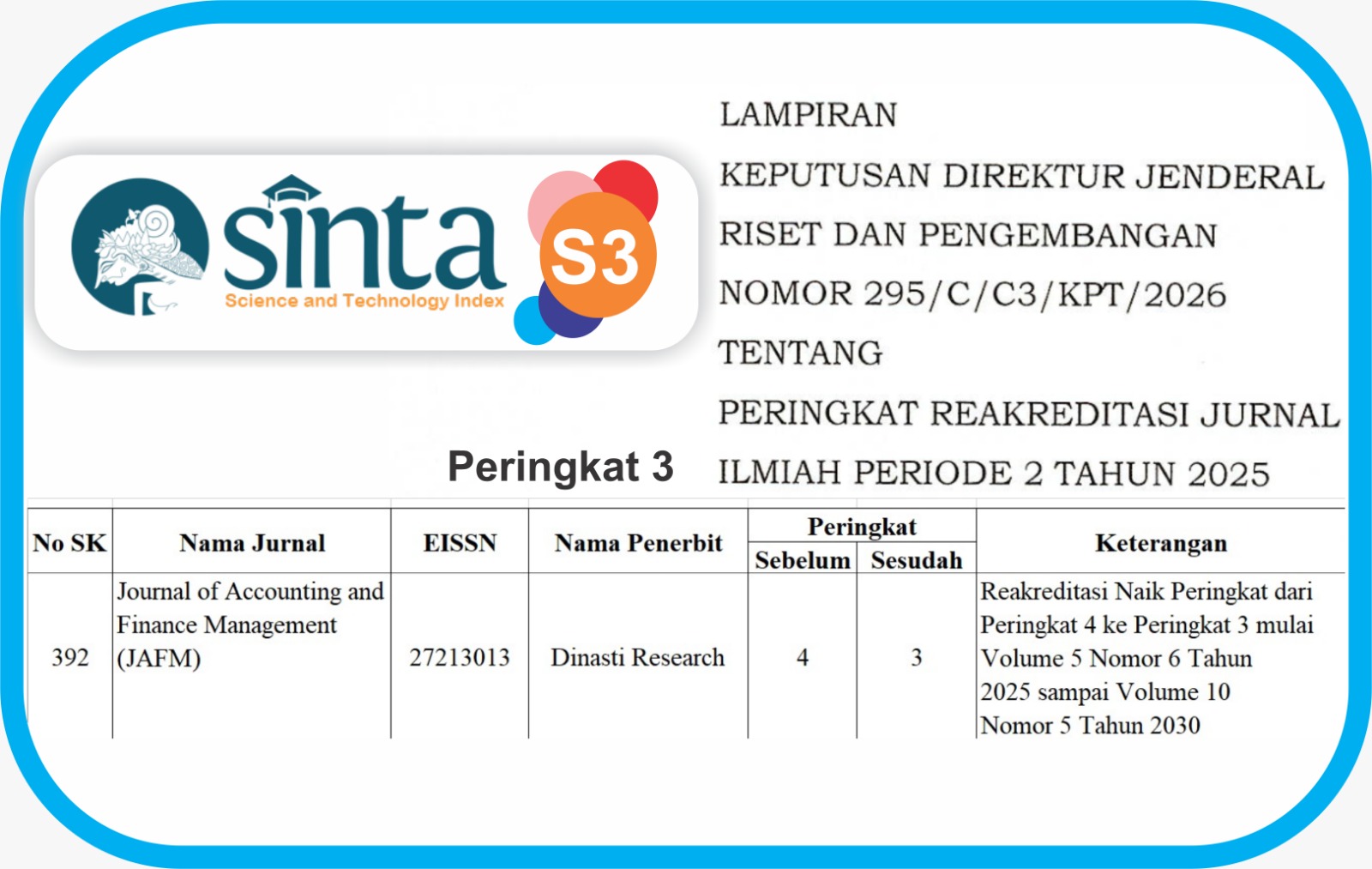Evaluating the Effectiveness of IPSAS 23 Regulations on the Redemption of Tax Revenues by the Ekiti State Government
DOI:
https://doi.org/10.38035/jafm.v4i5.272Keywords:
IPSAS 23 regulations, Revenue recognition, Revenue presentation and disclosure, Revenue measurement, Redemption of tax revenuesAbstract
Abstract: The study intends to shed light on how adherence to international public sector accounting standards (IPSAS) 23 can enhance the efficient utilization of tax revenues in Ekiti State. In this study, a survey design was employed. Questionnaires were distributed directly to the specified participants, who were the Revenue Officers of Ekiti State Internal Revenue Service (EKSIRS). The entire population comprised 428 revenue officers, and we chose to use a census sampling method, which encompasses the entire population at 100%. Out of all the questionnaires distributed, 311 were returned with completed responses. The collected data was subsequently analyzed using both descriptive and inferential statistical techniques. The results analysis found that the collective impact of IPSAS 23 regulations, including revenue recognition, revenue presentation and disclosure, and revenue measurement, is a reliable predictor of tax revenue redemption by the Ekiti State Government. In essence, the implementation of these IPSAS 23 regulations significantly contributes to the redemption of tax revenues, signifying their importance in enhancing financial transparency and efficiency within the government's fiscal operations. It was concluded that revenue recognition emerges as a prominent contributor to tax revenue redemption, emphasizing the importance of accurate revenue recognition. This study then recommends that the Ekiti State Government should prioritize enhancing revenue recognition practices. This can be achieved through training and capacity-building for relevant staff to ensure accurate and timely recognition of revenue.
References
Adegbie, F. F., Ogbebor, I. P., & Athora, Z. A. (2023). Federal tax revenue and government expenditure on roads and power in Nigeria. International Journal of Economics, Business and Management Research, 7(6), 277-306.
Adewara, Y. M., Dagunduro, M. E., Falana, G. A., & Busayo, T. O. (2023). Effect of multiple taxation on the financial performance of small and medium enterprises (SMEs) in Ekiti State, Nigeria. Journal of Economics, Finance and Accounting Studies, 5(3), 121-129.
Akinadewo, I. S., Kayode, P. O., Dagunduro, M. E., & Akinadewo, J. O. (2023). Empirical examination of the relationship between contemporary tax administration systems and revenue generation capacity in selected states of Nigeria. International Journal of Developing and Emerging Economies, 11(2), 77-92.
Alkhabbaz, M. A., & Suresh, B. H. (2023). The impact of adopting international public sector accounting standards (IPSAS) on comparability of financial reports in the public sector of India. Compliance Engineering Journal, 14(6), 9-17.
Aluko, A. F., Igbekoyi, O. E., Dagunduro, M. E., Falana, G. A., Oke, O. E. (2022). Tax incentives and liquidity performance of quoted industrial goods firms in Nigeria. European Journal of Business and Management, 14(23), 11-22.
Hadisantoto, E. Arifuddin, Wawo, A. B., & Ridwan, M. (2023). The influence of original local government revenue, and specific allocation fund on government expenditure in Southeast Sulawesi District/City. Riset & Jurnal Akuntansi, 7(4), 3712-3719.
Ijeoma, N. B., & Oghoghomeh, T. (2014). Adoption of international public sector accounting standards in Nigeria: Expectations, benefits and challenges. The Journal of Investment and Management, 3(1), 21-29.
International Federation of Accountants (IFAC). (2022). IPSASB. Retrieved from https://www.ifac.org/ipsasb.
International Public Sector Accounting Standards Board. About IPSASB. (2021). Retrieved from https://www.ipsasb.org/about-ipsasb.
Jensen, G. (2016). International Public Sector Accounting Standards (IPSAS). International Federation of Accountants, 01-10.
Jensen, M. C., & Meckling, W. H. (1976). Theory of the firm: Managerial behavior, agency costs and ownership structure. Journal of Financial Economics, 3(4), 305–360. https://doi.org/10.1016/0304-405x(76)90026-x
Krishnan, S. R. (2016). IFRS and IPSAS Convergence in India - Transnational Perspectives. University of Manchester.
Murunga, J., Muriithi, M. K., & Wawire, M. W. (2021). The size of the informal sector and tax revenue in Kenya. Journal of Economics and Public Finance, 7(5), 15-35. http://dx.doi.org/10.22158/jepf.v7n5p15
Ofoegbu, G. (2014). New public management and accrual accounting basis for transparency and accountability in the Nigerian public sector. Journal of Business and Management, 16(3), 104-113.
Olatunji, C. O., & Dominic, O. O. (2019). Effect of internally generated revenue on budget implementation in Ekiti. Applied Finance and Accounting, 5(2), 10-19.
Serdarevi?, N., & Muratovi?-Dedi?, A. (2021). Revenue recognition and real earnings management in bosnian construction industry. Journal of Forensic Accounting Profession, 1(1) 21-34. https://doi.org/10.2478/jfap-2021-0002
Tanjeh, M. S. (2016). Factors Influencing the Acceptance of International Public Sector Accounting Standards in Cameroon. Accounting and Finance Research, 5(2), 71-83.
Tawiah, V. (2020). The impact of IPSAS adoption on corruption in developing countries, Financial Acc & Man,1–22.
Transparency International (2016). Corruption Perception Index 2016. Retrieved from http://www.transparency.org United Nations economic commission for Africa (2015). Illicit
Wang, Z., & Miraj, J. (2018) Adoption of International Public Sector Accounting Standards in Public Sector of Developing Economies -Analysis of Five South Asian Countries. Research in World Economy, 9(2), 44-51.
Zhuquan, W., & Javed, M. (2018). Adoption of International Public Sector Accounting Standards in Public Sector of Developing Economies - Analysis of Five South Asian Countries. Research in World Economy 9(2).
Downloads
Published
How to Cite
Issue
Section
License
Authors who publish their manuscripts in this journal agree to the following conditions:
- The copyright on each article belongs to the author(s).
- The author acknowledges that the Journal of Accounting and Finance Management (JAFM) has the right to be the first to publish with a Creative Commons Attribution 4.0 International license (Attribution 4.0 International (CC BY 4.0).
- Authors can submit articles separately, arrange for the non-exclusive distribution of manuscripts that have been published in this journal into other versions (e.g., sent to the author's institutional repository, publication into books, etc.), by acknowledging that the manuscript has been published for the first time in the Journal of Accounting and Finance Management (JAFM).




























